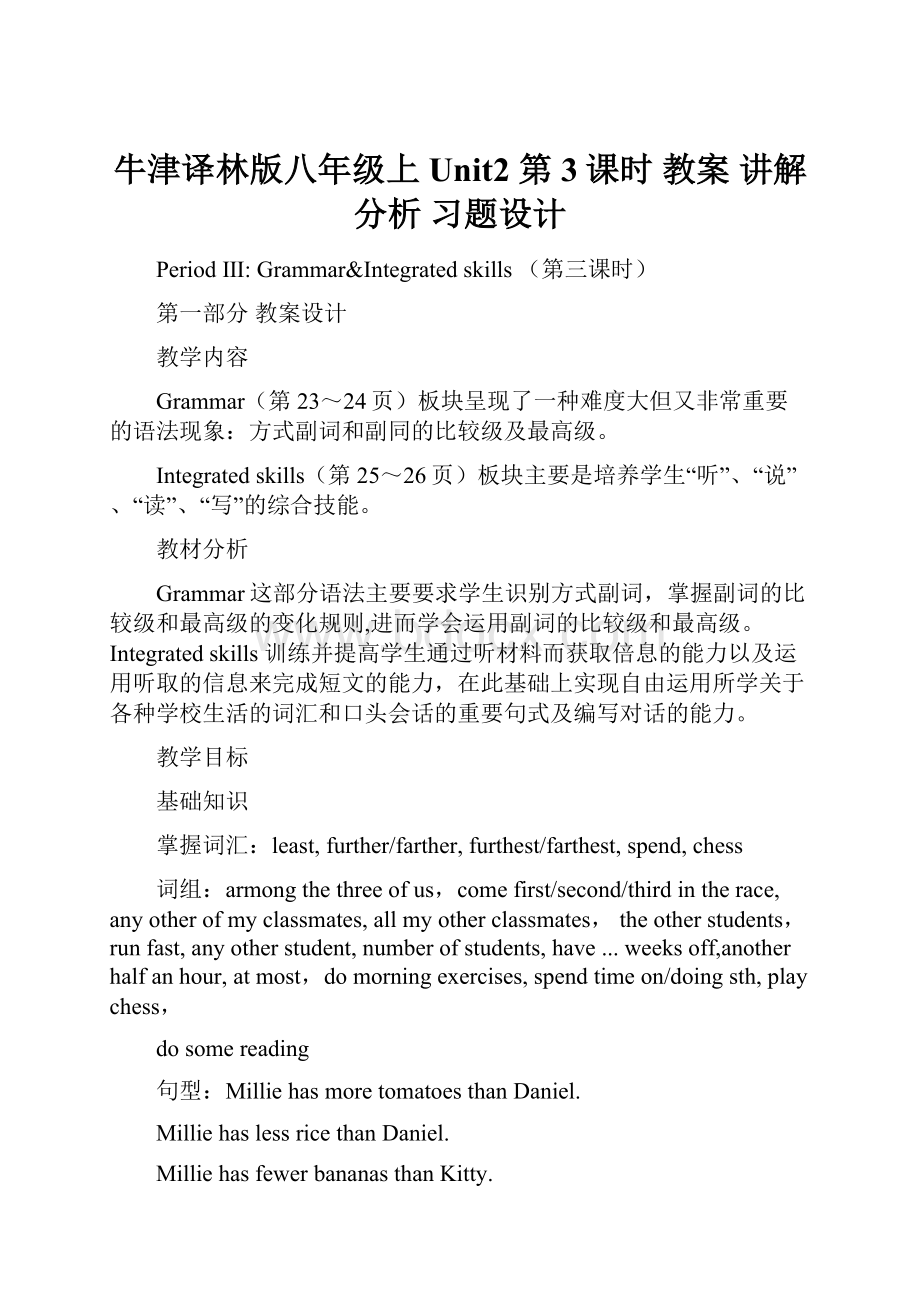牛津译林版八年级上Unit2第3课时教案 讲解分析 习题设计.docx
《牛津译林版八年级上Unit2第3课时教案 讲解分析 习题设计.docx》由会员分享,可在线阅读,更多相关《牛津译林版八年级上Unit2第3课时教案 讲解分析 习题设计.docx(18页珍藏版)》请在冰豆网上搜索。

牛津译林版八年级上Unit2第3课时教案讲解分析习题设计
PeriodⅢ:
Grammar&Integratedskills(第三课时)
第一部分教案设计
教学内容
Grammar(第23~24页)板块呈现了一种难度大但又非常重要的语法现象:
方式副词和副同的比较级及最高级。
Integratedskills(第25~26页)板块主要是培养学生“听”、“说”、“读”、“写”的综合技能。
教材分析
Grammar这部分语法主要要求学生识别方式副词,掌握副词的比较级和最高级的变化规则,进而学会运用副词的比较级和最高级。
Integratedskills训练并提高学生通过听材料而获取倍息的能力以及运用听取的信息来完成短文的能力,在此基础上实现自由运用所学关于各种学校生活的词汇和口头会话的重要句式及编写对话的能力。
教学目标
基础知识
掌握词汇:
least,further/farther,furthest/farthest,spend,chess
词组:
armongthethreeofus,comefirst/second/thirdintherace,anyotherofmyclassmates,allmyotherclassmates,theotherstudents,runfast,anyotherstudent,numberofstudents,have...weeksoff,anotherhalfanhour,atmost,domorningexercises,spendtimeon/doingsth,playchess,
dosomereading
句型:
MilliehasmoretomatoesthanDaniel.
MilliehaslessricethanDaniel.
MilliehasfewerbananasthanKitty.
Kittyhasthemosteggs.
Danielhasthefewesttomatoes.
Milliehastheleastjuice.
SheranfasterthanMillie.
Amycamefirstintherace.Sheranthefastest.
SunshineMiddleSchoolhasthemostteachersandstudentsofthethree.
ChinesestudentshavefewerweeksoffforthesummerholidaythanBritishstudents.
BritishstudentsspendlesstimedoinghomeworkthanChinesestudents.
Amongthethreeschools,Americanstudentsspendtheleasttimeonhomework.
Theyworkthehardest.
Ihaveonlyhalfanhourformyhobbiesatmost.
基本技能:
1运用more...than、fewer...than和less...than比较数量。
2运用themost比较三个或三个以上的事物,表示数量最多;运用thefewest和the
least比较三个或三个以上的事物,表示数量最少。
3听取细节,提炼信息,了解更多有关中外学校生活的异同点。
综合素质:
1.能掌握副词比较级和最高级的构成并正确运用副词比较级和最高级。
2.能使用相关话题进行口语交际。
教学重难点及突破
重点:
掌握基本的四会单词、词组及句型。
难点:
正确运用副词比较级和最高级。
教学突破:
通过教师的讲解,开展多种形式的活动,帮助学生自己总结知识,应用知识。
教学准备
教师准备:
多媒体课件。
学生准备:
可供数量比较的实物或图片。
教学设计
StepIPresentation(呈现)
1.Helpthestudentsfocusonthesubjectsandtheafter-schoolactivitiesbyaskingsomequestions:
(1)WhatsubjectsdoesJohn/Nancyhaveathisschool?
(2)Whatdidtheydoduringtheirfreetime?
2利用实物或教学图片先让学生自由对话比较两样东西的数量,可以先给出示例,如:
Ihaveoneapple.Hehastwoapples.Hehasmoreapplesthanme.Ihavefewerapplesthanhim.板书more...than和fewer...than。
让学生拿出身边有的实物操练可数名词的数量比较。
接着,教师呈现图片,图中Simon和Sandy各拿一杯橙汁,与学生开展一些问答。
3板书less...than,教师利用课件呈现一个表格,表格中含有Simon和Sandy的牛奶、鱼、咖啡等物品,让学生模仿运用上述句型进行对话操练。
4让学生仔细观察例句并得出结论:
Weusemore…thanandfewer...thantotalkaboutcountablenouns.Weusemore...thanandless...thantotalkaboutuncountablenouns.
5呈现课本第23页的图片,先用more...than、fewer...than、less...than进行两者之间数量的比较,教师可示范:
MilliehasmoretomatoesthanDaniel.鼓励学生尽可能多说几个句子。
并以同样的方式引出themost和theleast,板书themost、thefewest和theleast。
根据图片内容,让学生小组内自由操练:
Whohasthemost/thefewest/theleast…?
6鼓励学生得出以下结论:
Weusethemostandthefewesttotalkaboutcountablenouns.Weusethemostandtheleasttotalkaboutuncountablenouns.
7和学生一起总结比较数量时形容词比较级和最高级的构成-many—more—themostmuch—more—themostfew一fewer一thefewestlittle—less—theleast
StepIIPractice(操练)
1学生完成A1部分,先让学生用more...than、less...than、fewer...than、themost,thefewest、theleast口头操练表格内容,再按要求完成句子,并让学生朗读。
2鼓励学生Freetalk自己的学校生活,如:
Howmanysubjectsdoyouhave?
Howmanyclubsareyouin?
Howmuchfreetimedoyouhaveeveryday?
指导学生造句:
MakesentencestocompareyourschoollifewithNancy's,John'sandDaniel's.
BComparativeandsuperlativeadverbs
StepIPresentation(呈现)
1呈现课本第24页上方的图片,与学生问答的同时以文字的形式呈现:
Millieranfast.
Sandyranfaster.
Amyranthefastest.
2标注出副词比较级和最高级的变化,引导学生找出规律:
副词比较级、最高级的构成方法和形容词比较级、最高级的构成方法一致。
(1)大多数单音节的副词后加-er/-est
hard—harder—hardesthigh—higher—highest
(2)两个或两个以上音节的副词,应在前面加more/mostquickly—morequickly—mostquicklycarefully—morecarefully—mostcarefully
(3)一些不规则副词的变化
well—better—bestbadly—worse—worst
far一further/farther_furthest/farthest
StepIIPractice(操练)
1学生小组内练习,根据身边人的做事方式,使用副词比较级和最高级进行口头操练。
教示范:
Igetupearlyinthemorning.Myfathergetsupearlierthanme.Mymothergetsuptheearliest.
2指导学生完成课本第24页的练习,自我朗读核对完成的句子。
3完成随堂练习。
Integratedskills(学习Integratedskills)
StepIReview(复习)
Freetalk帮助学生复习重点信息。
StepIIListening(听力)
1浏览A1部分的表格,了解需要完成的相关信息。
2让学生先听一遍录音,完成表格的第一栏,并核对答案。
3师说:
SandyishelpingDanielcollectinformationaboutotherschoolsontheInternet.Listentotheirconversationandcompletetherestofthetable.
StepIIIPractice(操练)
1根据A1部分的表格内容,组织学生分组练习,对三所学校进行比较,师说:
Canyoumakeadialoguewithyourclassmatetocomparethesethreeschools?
教师通过提问给出示范。
引导学生运用more/fewer/l«s...than.themost/fewest/least来比较事物。
2做A3部分的练习前,先让学生看一遍Daniel的文章,检査他们是否理解义章大意。
让学生用A1部分的信息独立完成填空练习,然后再与同伴讨论答案。
全班核对后朗读完整的短文。
3教师呈现一些问题,检查学生是否还记得Daniel、John和Nancy的情况:
让学生根据A1和A3的信息,完成A4部分的练习。
BSpeakup:
Simonspendsthemosttimeonhishobbies.
StepIPresent“Speakup”(新授Speakup)
1Freetalk:
doyouhaveanyhobbies?
Whatarethey?
Whendoyouusuallydoyourhobbies?
Howmuchtimedoyouspendonyourhobbieseveryday?
2创设情境,呈现新知识。
Hobbiesaregoodforus.They'refun.Butwecan'tspendtoomuchtimeonourhobbies.Wehavetodoourhomework.Sometimeswehavetohelpourparentsdosomehousework,sowecanonlyspendoneortwohoursadayforourhobbiesatmost.板书atmost,让学生理解其含义,同时可以补充atleast。
StepIIListening(听力)
1介绍对话背景:
TheClass1,Grade8studentsaretalkingaboutthetimetheyspendontheirhobbies.Pleaselistentotheirconversationandfindouttheanswerstothesequestions:
HowmuchtimedoesDanielspendonhishobbieseveryday?
WhataboutSimon/Amy/Millie?
2学生带着问题听录音并找出答案:
Danielspendsonehouradayonhishobbies.Milliehasonlyhalfanhourforherhobbieseveryday.Simonhastwohoursforsports.Amygoesswimmingforabouthalfanhoureveryday.
3再听一遍录音,并两人一组问答-
(1)Whospendsmore/lesstimeonhis/herhobbies?
(2)Whospendsthemost/leasttimeonhis/herhobbies?
StepIIIPractice(操练)
1跟录音朗读对话,Nowrepeattheconversationafterthetapesentencebysentence.如需要可多跟读几遍。
2小组内分角色朗读对话。
StepIVActout(表演)
1鼓励学生模仿课本上的对话,讨论并发挥想像编写一段新的对话,t'syourturnnow.Pleaseworkingroupsoffourandtalkaboutthetimeyouspendonyourhobbies.
2通过等级得分等方式,选择不同层次的学生上台展示。
教材习题
教材第23页PartA1more;fewer;mos2more;fewer;fewest3less;more;least;most
教材第24页PartB1well;better;thebest2high;higher;thehighest
3fast;faster;thefastest4quickly;morequickly;themostquickly
教材第25页PartA1
SunshineMiddleSchool
WoodlandSchool
RockyMountainHighSchool
Numberofstudents
1,309
308
1,215
Numberofteachers
90
66
85
Howlongisthesummerholiday?
8weeks
6weeks
12weeks
Howmuchtimedostudentsspendonhomeworkeveryday?
3hours
2hours
1hour
Dostudentswearuniforms?
yes
/
no
Dostudentsdomorningexercises?
yes
/
no
PartA31fewer2fewer3themost4more5less6theleast7thelongest8themost9thehardest
教材第26页PartA41Nancy2John3John4Daniel5Nancy
随堂小练习
根据句意和所给单词填空
1.Pleasepracticeas_________(much)asyoucan.
2.Theteachertolduslight________(travel)fasterthansound.
3.Wehopehe_______(win)thefirstprizeagaininthe2016OlympicGames.
4.Wendyspends6hours________(practice)_________(play)tabletenniseveryday.
5.Itrainedheavilythismorning,somyfather________(drive)metoschool
6.---Doeshehaveanyh________?
----Yes,ofcourse.JayZhouis.
7.Doyouknowwhattheshortform(形式)fora__________is?
It’sad.
8.Ifyouwanttokeep_________(健康),youneedtoexerciseeveryday.
Keys:
1.much2.travels3.willwin4.practicing;playing5.drove6.hero7.advertisement8.healthy
StepVHomework(家庭作业)
1复习本课出现的语法内容。
2记忆本课时所学的词汇、词组和句型。
3背诵B部分的对话。
板书设计
Unit2Schoollife
Grammar&Integratedskills
Words:
least,further/farther,furthest/farthest,spend,chess
Phrases:
armongthethreeofus,comefirst/second/thirdintherace,anyotherofmyclassmates,allmyotherclassmates,theotherstudents,runfast,anyotherstudent,numberofstudents,have...weeksoff,anotherhalfanhour,atmost,domorningexercises,spendtimeon/doingsth,playchess,dosomereading
Sentences:
MilliehasmoretomatoesthanDaniel.
MilliehaslessricethanDaniel.
MilliehasfewerbananasthanKitty.
Kittyhasthemosteggs.
Danielhasthefewesttomatoes.
教学探讨与反思:
本节课是语法教学,采用任务型教学法,由于在具体的情境中进行,因此学生对语法学习产生了很大兴趣,也更加容易接受和理解,当然还要采用更多精准的练习来帮助学生学以致用。
精心设计听力教学的各个环节,在学习重要语法、词汇的基础上,让学生有准备地积极地参与听力活动中去,激发学生听的动力和完成听力材料的欲望,进而有效地开展围绕“听”“说”进行的的各项活动。
第二部分讲解分析
一、新词的导学与解读
1.problem
【用法】n.问题;难题;引起麻烦的人
【举例】Thisisadifficultproblem.这是一个难题。
Shewasthinkingaboutamathproblem.她正在思考一道数学题。
【拓展】difficultproblem难题;难问题;noproblem没问题
mathproblem数学题;solvetheproblem解决问题
【举例】一Canyourepairthebike?
你能修好这个自行车吗?
一Noproblem。
没问题。
We’dbettersolvetheproblemfromtheroot.
要解决问题,最好从它的根源处着手。
【辨析】problem和question两个词的区别:
这两个词虽然都译作“问题”,但两者有一定的区别。
problem指须待解决的问题,是就困难而言的;
question指须待解答的问题,是就疑问而言的。
【举例】What’syourquestion?
Canyouanswerit?
你的问题是什么?
你能自己回答吗?
What'syourproblem?
CanIhelpyou?
你的问题(困难)是什么?
我能帮助解决吗?
【实践】根据汉语意思完成句子
1.这个问题太难了,我小女儿无法解答。
The_______istoodifficult,mylittledaughtercouldn'tanswerit.
2.她不能谋得那份工作的主要问题是她是女人。
Shecouldn'tgetthejob,themain_________isthatsheisawoman.
【点译】1.question2.problem
2.polite
【用法】adj.有礼貌的;客气的;优雅的
【举例】Heisverypolitetoeveryone.
他对每个人很客气。
It'spolitetogiveyourseattoanoldmanonthebus.
在公共汽车上把座位让给老人是个有礼貌的行为。
Itisnotpolitetocutinwhensomeoneistalking.
在别人讲话时插嘴是不礼貌的。
【拓展】bepoliteto对……有礼貌
politenotice有礼貌的告示;温装提示
politegreeting礼貌问候语
impoliteadj.没礼貌的;不文雅的
【举例】Weshouldbepolitetoourparents.
我们应该对我们的父母有礼貌。
It'simpolitetospeakloudlyinpublic.
在公共场合大声说话是不礼貌的。
【实践】根据汉语意思完成句子
你为什么这样无礼?
Whyshouldyoube_______?
【点译】soimpolite
3.number
【用法】n.数字;数目
【举例】Doyouknowwhatthisnumberis?
这个数字是什么?
Canyoutellmeyourphonenumber?
您能告诉我你的电话号码吗?
【拓展】thenumberof意为“……的数目”,谓语动词用单数。
anumberof意为“许多;大量……”,谓语动词